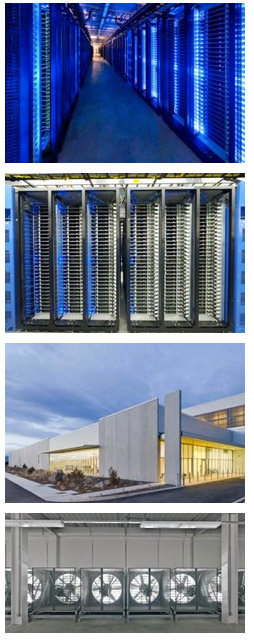Facebook Data Center Storage Cabinet Design Offers Unique Solution For Supporting Massive Amounts of Data
Facebook is a huge, now-public company. With around a billion users, it has become far more than a social network. It's a bona fide destination on the Internet, for a variety of people, brands, companies, and marketers. It has evolved into something deeper than a place to share your most prominent feelings. It has become a place for small businesses to get started, for far-flung relatives to stay in touch, and for people with oodles of photos and videos to store and share their memories. You probably knew all of that, but have you ever stopped to consider what's happening behind the scenes to make it all happen?
Storing petabytes upon petabytes of data is no easy task, and maintaining uptime hovering around 100% makes it even more difficult. Facebook, at least on the back-end, is just as much a cloud storage company as Dropbox, Box, Microsoft, or Google. A recent report from Wired takes a look at some of the hardware that makes Facebook tick. The article mentions "massive" data centers, which store (presently, anyway) around 100 million gigabytes of photos and videos alone. Of course, tons more is added each day, so staying one step ahead of the "low storage" warning is a challenge unto itself.

The report also takes an inside look at the specific hardware used to run this. We're told about a top that has a slide-out tray with a crazy laptop-type device within. It's equipped with 15 drives, as well as a "friction hinge" that can support up to 800 pounds. Of course, Facebook is tasked with reducing power and hassle, so it has started to design its own data centers and servers, not to mention its own storage gear and racks. Interestingly, the company seems open to sharing these designs with the world, hoping that it'll spur further improvement around the tech / cloud world.
The prototype is called Knox, and it's being called an "open source" hardware design. The metal casing holds a variety of HDDs, but with a simple "poke," you can release just one in case you need to replace it. Will Facebook's hardware designs end up in enterprises beyond Menlo Park? Facebook sure seems to hope so.
Storing petabytes upon petabytes of data is no easy task, and maintaining uptime hovering around 100% makes it even more difficult. Facebook, at least on the back-end, is just as much a cloud storage company as Dropbox, Box, Microsoft, or Google. A recent report from Wired takes a look at some of the hardware that makes Facebook tick. The article mentions "massive" data centers, which store (presently, anyway) around 100 million gigabytes of photos and videos alone. Of course, tons more is added each day, so staying one step ahead of the "low storage" warning is a challenge unto itself.

The report also takes an inside look at the specific hardware used to run this. We're told about a top that has a slide-out tray with a crazy laptop-type device within. It's equipped with 15 drives, as well as a "friction hinge" that can support up to 800 pounds. Of course, Facebook is tasked with reducing power and hassle, so it has started to design its own data centers and servers, not to mention its own storage gear and racks. Interestingly, the company seems open to sharing these designs with the world, hoping that it'll spur further improvement around the tech / cloud world.
The prototype is called Knox, and it's being called an "open source" hardware design. The metal casing holds a variety of HDDs, but with a simple "poke," you can release just one in case you need to replace it. Will Facebook's hardware designs end up in enterprises beyond Menlo Park? Facebook sure seems to hope so.

